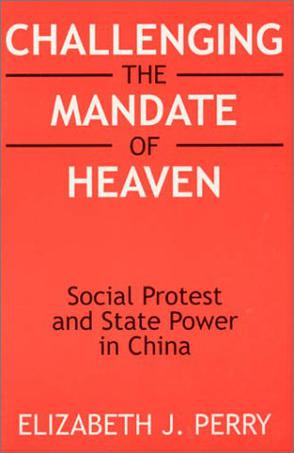-

Challenging the Mandate of Heaven
Social science theories of contentious politics have been based almost exclusively on evidence drawn from the European and American experience, and classic texts in the field make no mention of either the Chinese Communist revolution or the Cultural Revolution - surely two of the most momentous social movements of the twentieth century. Moreover, China's record of popular upheaval stretches back well beyond this century, indeed all the way back to the third century B.C. By bringing together studies of protest that span the Imperial, Republic, and Communist eras, this book introduces Chinese patterns and provides a forum to consider ways in which contentious politics in China might serve to reinforce, refine or reshape theories derived from Western cases. -

Cities and Stability
How and why has China managed to develop and urbanize without the slums that dominate large cities in other poor countries the world over? Why has the Chinese Communist Party persisted in power when so many other communist and autocratic regimes have fallen? I develop a general argument about redistribution, urbanization, and regime stability based on the Chinese case. Since 2002, scholars affiliated with the Chinese Communist Party have argued that the Chinese government fears "Latin Americanization" (la mei hua), that is, highly unequal megacities and their attendant crime, slums, and social instability. In response, the Chinese government has abolished agricultural taxes and begun subsidizing rural areas. This shift is anomalous since most developing countries give preferential treatment to cities in order to reduce the threat of urban unrest. I argue that such urban favoritism is self-defeating in the long-term because it induces further urbanization, increasing the long-term risk to the regime. Nevertheless, urban bias remains endemic in the developing world because most governments do not have the luxury to think beyond the short-term. I test the implications of this argument both cross-nationally and within China using quantitative and qualitative data. Cross-national survival analysis of autocratic regimes since World War II shows that urbanization, controlling for level of economic development, negatively affects regime duration. In order to study the mechanisms at work, I used 15 months of field research in Beijing and two other provinces to delve into the Chinese case. Two sets of analyses at the national and local level respectively illustrate how the government uses fiscal and other policies to maintain social stability and to control and direct urbanization. -

Social Organizations and the Authoritarian State in China
Received wisdom suggests that social organizations (such as non-government organizations, NGOs) have the power to upend the political status quo. However, in many authoritarian contexts, such as China, NGO emergence has not resulted in this expected regime change. In this book, Timothy Hildebrandt shows how NGOs adapt to the changing interests of central and local governments, working in service of the state to address social problems. In doing so, the nature of NGO emergence in China effectively strengthens the state, rather than weakens it. This book offers a groundbreaking comparative analysis of Chinese social organizations across the country in three different issue areas: environmental protection, HIV/AIDS prevention, and gay and lesbian rights. It suggests a new way of thinking about state-society relations in authoritarian countries, one that is distinctly co-dependent in nature: governments require the assistance of NGOs to govern while NGOs need governments to extend political, economic, and personal opportunities to exist. -

全球化与中国国家转型
过去的几十年中,全球化席卷了世界的每一个角落,为世界各国带来了空前的机遇和严峻的挑战。《全球化与中国国家转型》从国家重建的角度对全球化带给中国的政治影响以及中国的回应作了精辟而富有启迪性的分析。 作者认为,在90年代中国的背景下,全球化不仅意味着市场经济的发展,还意味着对西方国家产品的有选择的输入。中国的领导者把全球化视为重建中国国家的独特机遇。为此,他们付出巨大努力去确立一种与变动的社会经济环境相适应的新政治秩序,并重建了官僚体制以及其他重要的经济制度。作者也考察了全球化和国家重建过程中不同社会力量的反应以及他们试图参与的不同方式。全球化使中国的经济治理体制实现了根本性转型,那么是否会由此产生以“法治”为基础的政治治理结构7作者最后认为这取决于党自身的转型。 -

转型中的地方政府
《转型中的地方政府:官员激励与治理》是从政治经济学的角度出发,探究中国国情的特殊性与发展道路的独特性,并在此基础上分析中国在改革三十年中所经历的变革和转型过程。中国的改革开放30年间,华夏大地上演了一场人类历史上的伟大变迁,世人称之为“中国奇迹” 。中国发展的历史记录、经验不同于西方国家,鉴于此,现有西方经济学理论就不能完整地解释中国发展。 -

Social Protest and Contentious Authoritarianism in China
Xi Chen explores the dramatic rise in social protests in China since the early 1990s. Drawing on case studies, interviews, and government records of collective petitions, this book examines how the political structure in Reform China has encouraged Chinese farmers, workers, pensioners, disabled people, and demobilized soldiers to claim their rights by staging collective protests. Challenging the conventional wisdom that authoritarian regimes always repress popular collective protest, Chen suggests that routine contentious bargaining between the government and ordinary people has actually contributed to the regime's resilience. "Xi Chen's impressive study represents the best of recent scholarship on China: conceptually innovative, empirically rich, and historically grounded. His state-centered model of 'contentious authoritarianism' sheds new light on the surge of social protest in China in recent years and, equally importantly, on why social protest does not necessarily threaten the stability of the current regime." - Bruce Dickson, George Washington University "This book highlights why China defies labeling. National leaders shun meaningful democratic reform but seem to believe that 'facilitating' and even 'routinizing' social protest help maintain stability. Infuriated folks increasingly turn to 'trouble-making' against foot-dragging local authorities but generally avoid outright confrontation. Caught in cross-cutting pressures from above and below, local government officials grudgingly accommodate popular claims to 'lawful rights and interests' even though they dispute the 'lawfulness' of such claims. Complexities like these call for innovative conceptualizations like 'contentious authoritarianism.'" - Lianjiang Li, Chinese University of Hong Kong "Xi Chen offers an illuminating analysis of one of the most intriguing features of contemporary Chinese politics: regime stability in the face of rising social protest. Through an original study of collective petitioning, Chen underscores the central role of the Chinese state in channeling and containing rampant popular unrest. The resulting 'contentious authoritarianism,' as he characterizes this unusual system, presents a challenge both to social science theories of contentious politics and to conventional assumptions about authoritarian regimes." - Elizabeth J. Perry, Henry Rosovsky Professor of Government, Harvard University "Drawing on unusual access to provincial data on collective petitions and deep engagement with the specialized literature on Chinese politics and disciplinary theories about contentious politics, Xi Chen shows how localized collective protests have been woven into the structure of government authority in China. Chen's effort to unravel this paradox and spell out its implications for both China and political sociology will become a benchmark in our understanding of China's rapidly evolving society and polity." - Andrew Walder, Stanford University